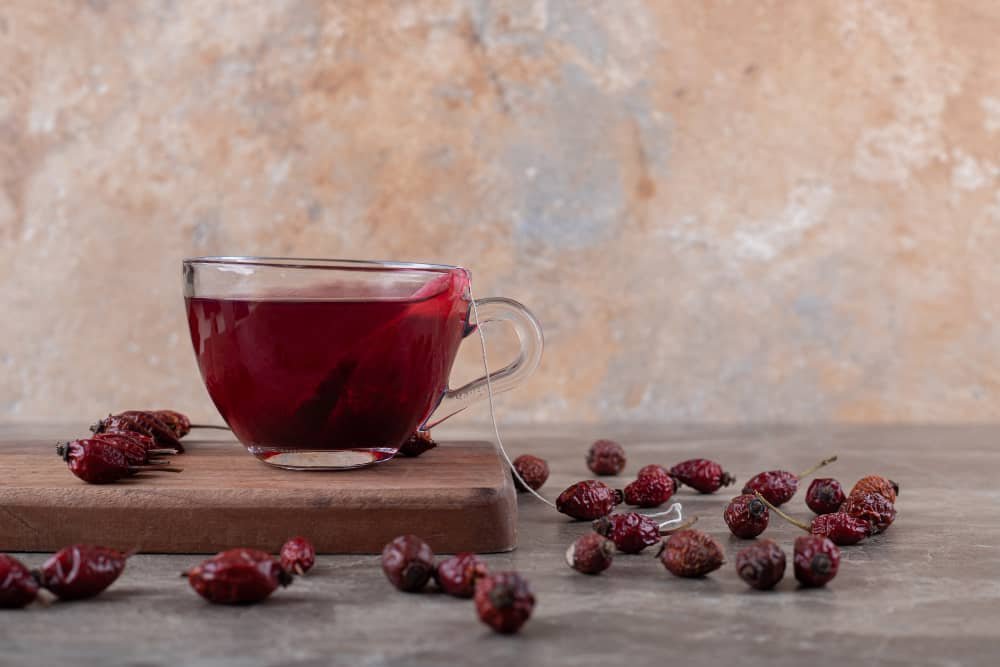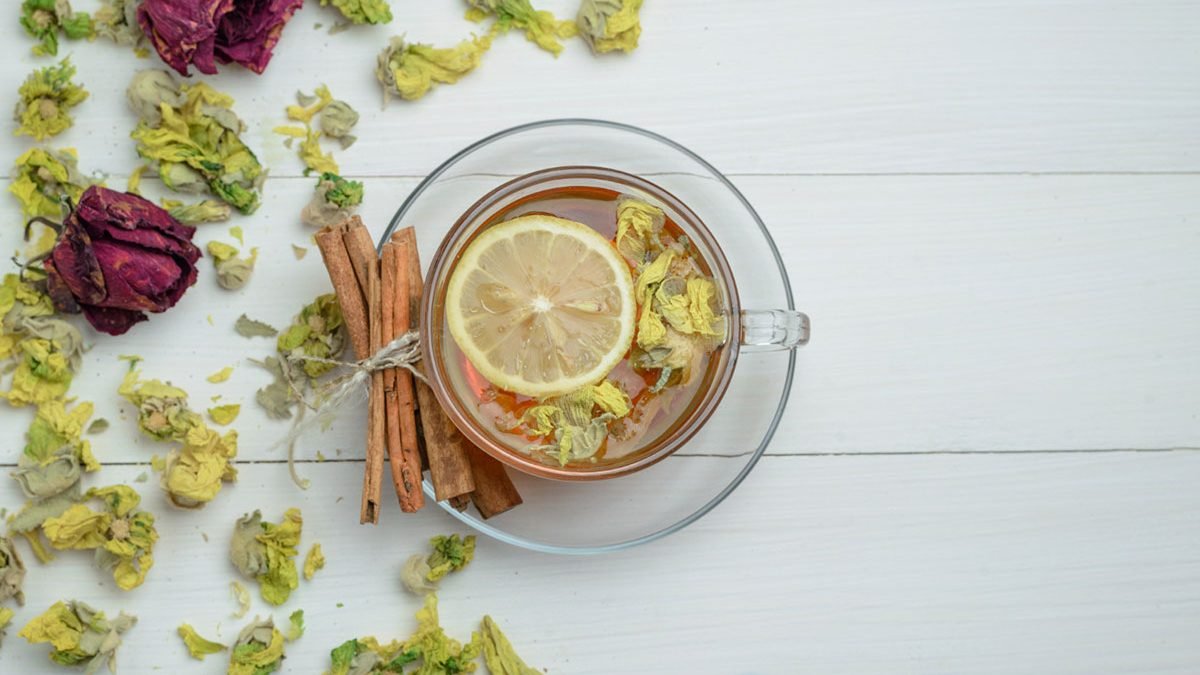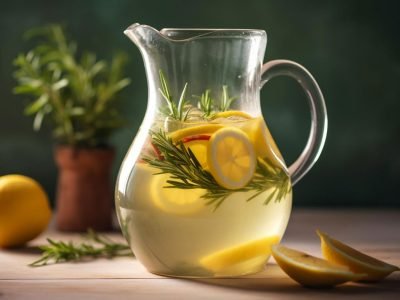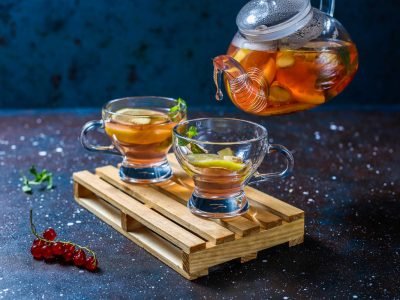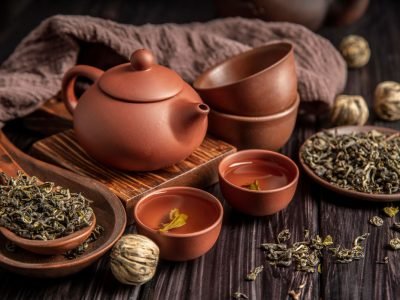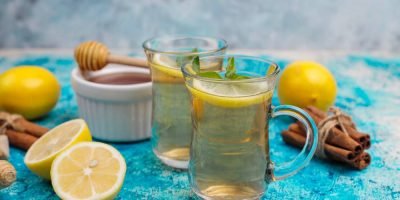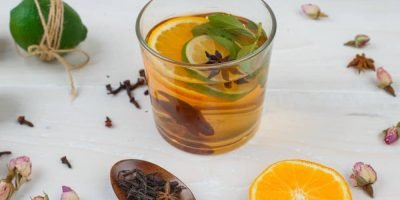Find Inner Peace With These 12 Relaxing Herbal Tea Recipes
Are you looking for relaxing herbal tea recipes to unwind and relax after a long, stressful day? Look no further than these soothing and rejuvenating herbal tea recipes. With their delightful blend of aromatic herbs and calming properties, these teas are the perfect remedy to help you melt away the stress and find tranquility in every sip.
In today’s fast-paced and hectic world, finding time to unwind and relax is more important than ever. One way to achieve relaxation is through the soothing ritual of sipping on a warm cup of herbal tea. Herbal teas have been used for centuries as natural remedies to promote relaxation, reduce stress, and improve overall well-being.
Whether you’re looking for a way to wind down after a long day or simply seeking tranquility in your busy schedule, these relaxing herbal tea recipes will surely bring calmness and serenity into your life.
Finding inner peace is essential to living a healthy and balanced life. This inner peace can come from many avenues, and one great way to find it is through herbal teas. Herbal teas are an excellent way to find calm and relaxation and boost your physical and mental health.
This article will look at some benefits of drinking herbal teas and provide vibrant and delicious recipes for eight of the most calming and relaxing herbal tea recipes. These recipes will help you find the inner peace you’re searching for.
Herbal teas have been consumed for centuries. They are an excellent source of antioxidants, vitamins, and minerals known for their health-promoting properties. In addition, these teas are known for calming the nerves and reducing stress. Herbal teas can provide the body with relaxation and tranquility and help you find the inner peace you need to live a healthy and fulfilling life.
These teas also have the unique ability to promote a sense of focus and clarity. This sense of clarity can help you reduce stress, think more clearly, and be more productive in your everyday life. These teas can help you remain calm and composed in stressful situations, allowing you to respond more effectively and positively.
These eight herbal teas will help you find relaxation and inner peace. Each tea brings unique flavors and health benefits, allowing you to enjoy a delicious beverage and find inner peace simultaneously. We will look at each tea’s health benefits and provide instructions for preparing them.
So get ready to find inner peace with these eight relaxing herbal teas. Let’s get started!
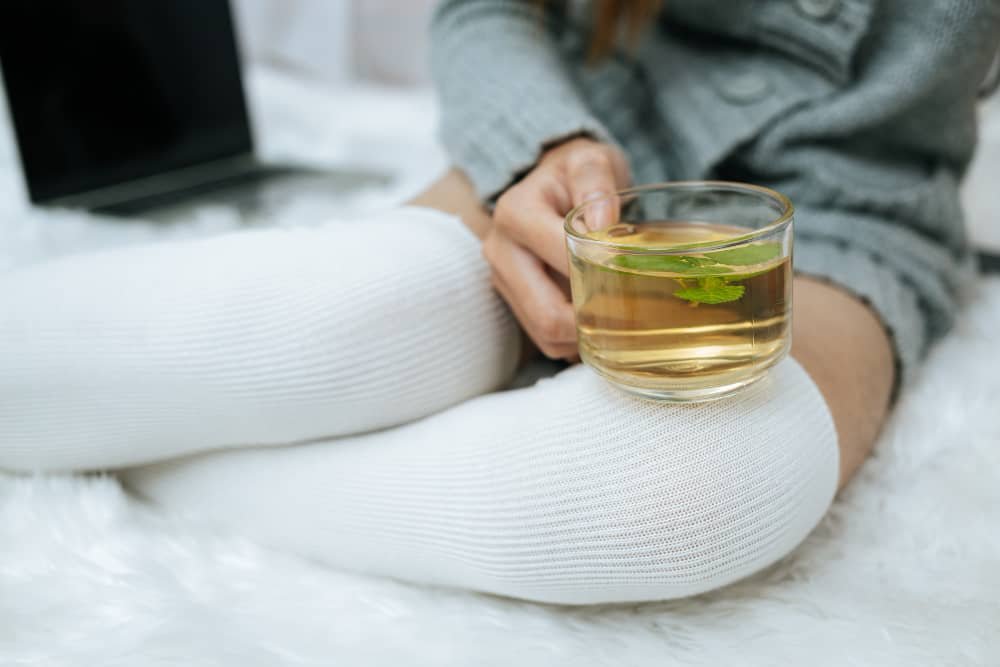
Top Relaxing Herbal Tea Recipes
From classic favorites like chamomile and lavender to lesser-known herbs like passionflower and lemon balm, many delightful ingredients can be combined to create the perfect cup of relaxation.
Recipe 1: Chamomile Tea
When it comes to herbal teas, chamomile tea is probably the first to come to mind. It is commonly enjoyed in many cultures and has a reputation for being one of the most calming and soothing teas. Chamomile is derived from the daisy-like flowers of the Asteraceae family and has a distinct and pleasant aroma. Not only does it have a wonderful taste, but it also offers a plethora of health benefits.
Chamomile tea contains high levels of antioxidants, which help to reduce inflammation and protect the body from oxidative stress. It is also an excellent source of vitamins and minerals such as magnesium, calcium, potassium, and vitamins A and C. Furthermore, it is known to be a powerful relaxant and can help to reduce stress and anxiety. Drinking chamomile tea can also help to improve sleep quality, as it has been found to reduce the time it takes to fall asleep and increase the duration of deep sleep.
In terms of its medicinal properties, chamomile tea has been used for centuries to treat various ailments, including stomachaches, headaches, menstrual cramps, insomnia, and anxiety. It is also known to have antispasmodic properties, which can help to reduce muscle tension and spasms.
Now that you know more about the health benefits of chamomile tea, let’s get to the recipe! To make your chamomile tea, you will need:
– 2 teaspoons of dried chamomile flowers
– 1 cup of boiling water
To make the tea, add the chamomile flowers to the boiling water and steep for 10 minutes. Strain the tea and enjoy! You can also add honey or lemon to the tea if desired.
Chamomile tea is a great way to help you relax after a long day or enjoy calming tea before bedtime. It is also an excellent tea to sip on during stress, as it can help reduce anxiety and promote a sense of peace and well-being. So, if you’re looking for a natural way to unwind, why not try chamomile tea?
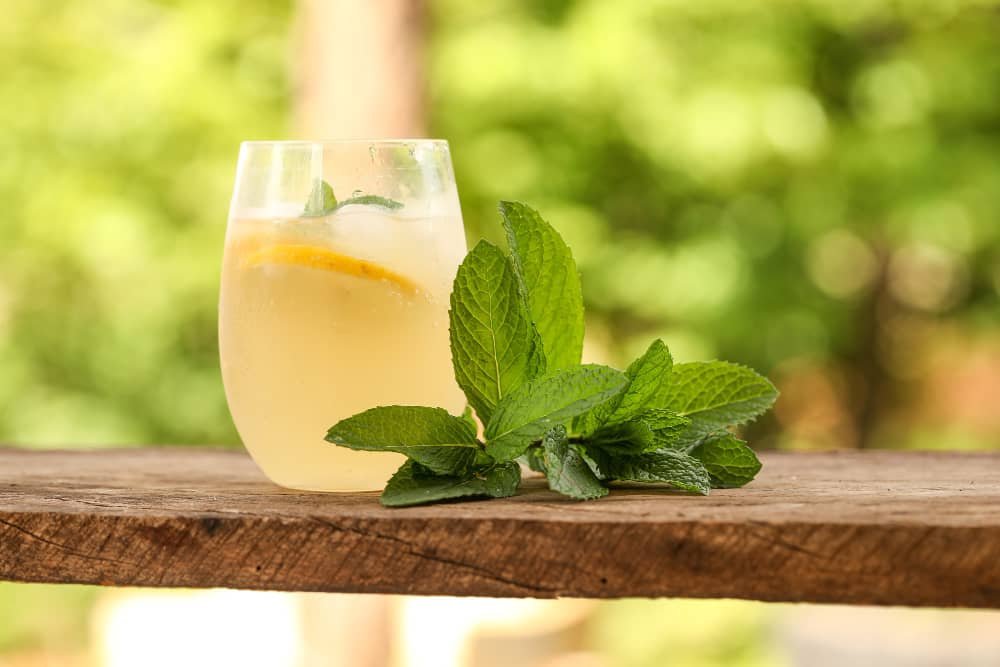
Recipe 2: Lemon Balm Tea
Regarding relaxing herbal teas, Lemon Balm Tea should be on your list. As one of the oldest herbal teas known to man, it dates back several centuries and is famous for its calming effects. It has a light, lemony flavor that can be enjoyed hot or cold.
Lemon balm has many benefits, especially for those seeking inner peace. It can help reduce stress and anxiety, improve mood, and even help you sleep better. It contains active compounds that act as antioxidants and may have anti-inflammatory benefits. It also has antibacterial and antiviral properties, making it a great addition to your herbal tea repertoire.
Making Lemon Balm Tea is incredibly easy. You only need fresh lemon balm leaves, water, and honey (optional). Start by gathering a handful of fresh lemon balm leaves, which can be found at most health food stores. Rinse the leaves under cold water and allow them to dry. Boil a pot of water and add the leaves to it. Allow the leaves to steep for 5 minutes before straining the liquid into a mug. Sweeten it with a bit of honey if desired.
Lemon balm tea can also be made with tea bags or dried leaves. Add a teaspoon of dried lemon balm leaves to a cup of boiling water and allow it to steep for 5 minutes. Once the tea has steeped, strain the liquid into a mug. Again, you can sweeten it with honey if desired.
Whether you make it hot or cold, Lemon Balm Tea is a great way to relax and find inner peace. Apart from its stress-reducing and anxiety-relieving properties, this herbal tea boasts several other health benefits. With its effortless preparation, it can be savored as a refreshing drink throughout every season. So, the next time you want to take a break from the world, make yourself a cup of Lemon Balm Tea and find the inner peace you seek.
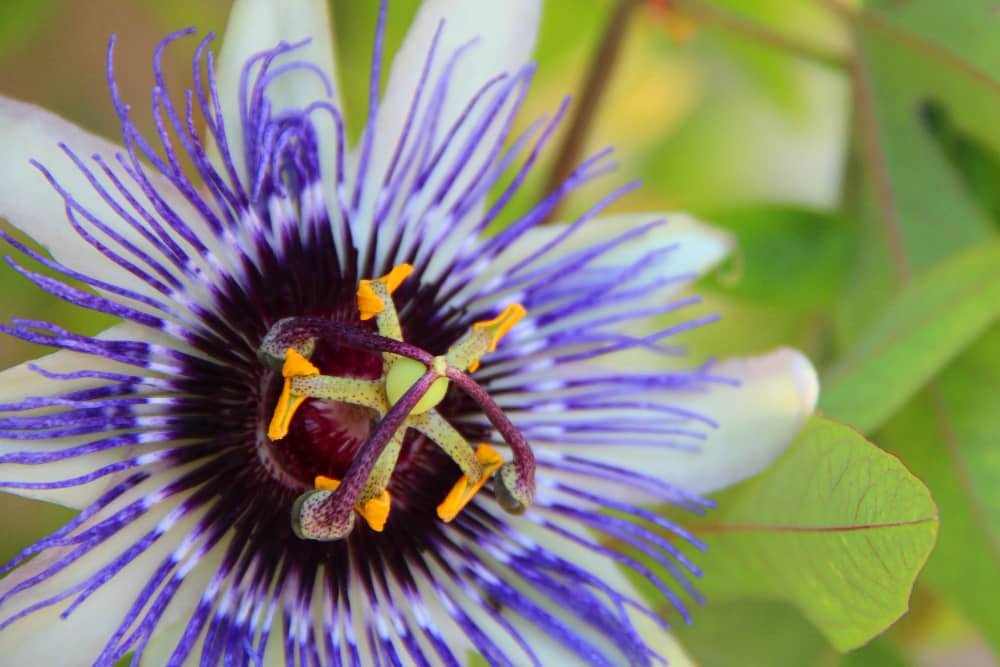
Recipe 3: Passionflower Tea
Passionflower tea is a fragrant and flavorful herbal tea used for centuries to help people relax and find inner peace. This tea is made from the leaves and stems of the passionflower plant, which are dried and crushed to create a calming and flavorful infusion.
Passionflower tea has many health benefits. It is known to help reduce stress and anxiety, promote restful sleep, and provide anti-inflammatory and antioxidant properties. This tea is also known to help improve mood, reduce fatigue, and relieve indigestion.
The flavor of passionflower tea is mild yet distinct and fragrant. It has a slightly sweet flavor with hints of citrus and floral notes. The aroma of passionflower tea is also pleasant, with a subtly sweet and floral scent.
Gather 1-2 teaspoons of dried passionflower leaves and stems to make passionflower tea. Place the leaves and stems in a tea strainer and pour 8 ounces of boiling water over them. Allow the tea to steep for 5-10 minutes, depending on how strong you would like your tea to be. Strain the tea into a cup, and enjoy your relaxing tea.
Passionflower tea is a great way to help you relax and find inner peace. It can be enjoyed in the morning or evening and can help you start your day in a positive mood or wind down after a long day. Passionflower tea can also be enjoyed as a part of your daily self-care routine to help you take a few moments to relax and find inner peace.
In addition to calming and relaxing properties, passionflower tea is also great for helping to support your overall health. It is known to help reduce stress, improve mood, and relieve indigestion. It is also a great source of antioxidants and can help to reduce inflammation.
Passionflower tea is a great way to help you relax and find inner peace. This fragrant and flavorful herbal tea is not only calming, but it is also great for helping to support your overall health. Enjoy a cup of passionflower tea today, and start your journey to finding inner peace.
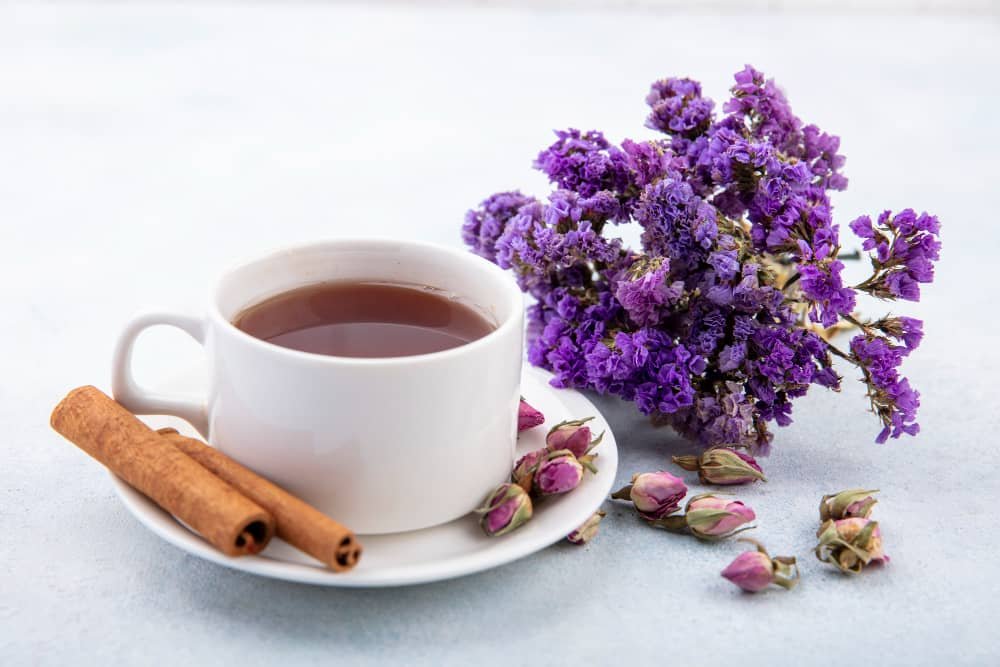
Recipe 4: Lavender Tea
Lavender tea has been used for centuries for its healing properties. Lavender blossoms’ delicate taste and aroma make it one of the most popular herbal teas. Not only does it have a relaxing effect, but it also offers several health benefits.
Health Benefits of Lavender Tea:
Lavender tea is high in antioxidants, which can help protect cells from damage caused by free radicals. These antioxidants also help reduce inflammation, improve circulation, and boost the immune system.
The calming effect of lavender tea has been used in traditional medicine for centuries to treat anxiety, depression, stress, and insomnia. The herb is believed to act as a mild sedative, helping to promote relaxation and calm nerves.
Lavender tea also has antimicrobial properties, which can help fight against bacteria and viruses. It can help reduce the symptoms of colds, flu, and other respiratory illnesses.
Recipe Instructions:
To make lavender tea, bring two cups of water to a boil. Remove the pot from the heat and add one teaspoon of dried lavender flowers. Allow the tea to steep for four to five minutes, then strain and serve.
You can steep the tea up to 10 minutes for a more robust flavor. Add a teaspoon of honey or fresh lemon wedges to the brewed tea for a more flavorful experience.
If you’re feeling under the weather, add a few drops of lavender essential oil to your tea for an even more powerful immune-boosting effect.
Lavender tea can be enjoyed either hot or cold. Try brewing iced lavender tea for a refreshing, summery drink. Simply double the amount of lavender used and allow it to steep for 8-10 minutes. Strain the tea and add a few extra sprigs of lavender for garnish.
Whether you’re looking to relax after a stressful day or seeking a natural remedy for a cold or flu, lavender tea can provide the perfect solution. So, pour yourself a cup and let the calming effects of this fragrant herbal tea take effect.
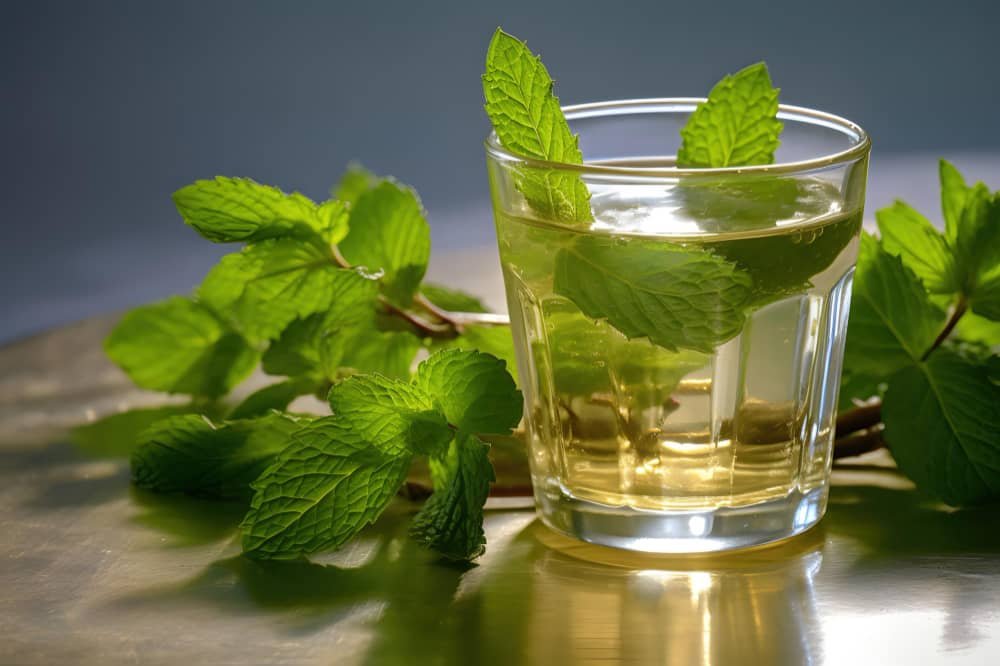
Recipe 5: Peppermint Tea
Peppermint tea is a popular herbal infusion that can provide you with impressive health benefits. It has a refreshing flavor and antioxidants, making it the perfect beverage for a peaceful evening. The best part is it’s easy to make, and you can enjoy the many benefits of peppermint tea in just a few minutes.
Health Benefits of Peppermint Tea
Peppermint tea is packed with antioxidants, which can help protect cells from free radical damage and support your immune system. It also contains menthol, which has anti-inflammatory properties that can help reduce swelling and discomfort from colds and other illnesses. Peppermint tea can also improve digestion, soothe nausea, and reduce gas. It also has calming sedative effects that can help you relax and unwind.
Recipe Instructions
To make peppermint tea, you will need a few simple ingredients. You will need a teaspoon of dried peppermint leaves, one cup of boiling water, and a strainer or tea ball.
Start by adding the dried peppermint leaves to the strainer or tea ball. Place the strainer or tea ball in a cup and pour the boiling water over it. Allow the tea to steep for 5-7 minutes. Once the tea steeps, remove the strainer or tea ball and discard the peppermint leaves.
If you’d like to sweeten the tea, add a teaspoon of honey or a few drops of a natural sweetener. Alternatively, you can add a splash of milk or cream if you prefer a creamy tea.
Once the tea is ready, pour it through a sieve to remove any remaining peppermint leaves. Enjoy your peppermint tea hot or iced.
Peppermint tea is the perfect beverage for a peaceful evening. It has a refreshing flavor, is full of antioxidants, and can provide impressive health benefits. You can easily make this tasty drink with simple ingredients in just a few minutes. So go ahead and give it a try today and find your inner peace with peppermint tea!
Recipe 6: Rosehip Tea
Rosehip tea is a delicious herbal tea enjoyed for thousands of years. Rosehip tea has many calming benefits, a magical concoction of sweet and earthy flavors.
Rosehip tea is made from the dried fruit of the wild rose, Rosa canina. It is rich in antioxidants, vitamin C, and minerals such as calcium, magnesium, iron, and potassium. This makes rosehip tea an excellent choice for promoting health and well-being in various ways.
One of the most significant benefits of rosehip tea is its calming effects. Rosehip has been used for centuries to promote relaxation and reduce stress. It has been known to help reduce anxiety and promote a sense of inner peace. This calming effect is due to the high levels of antioxidants in the tea, which help to reduce inflammation in the body.
Rosehip tea is also known to help with digestion. It can help to reduce bloating and improve overall digestion. It also helps to reduce inflammation in the digestive tract, which can lead to improved absorption of nutrients.
The Health benefits of rosehip tea extend beyond the digestive system. The antioxidants and anti-inflammatory compounds found in rosehip tea can help to boost the immune system and reduce the risk of chronic illness and disease. It also helps to reduce fatigue, improve energy levels, and make you feel more alert.
Rosehip tea is also high in vitamin C, which can help boost collagen production. This benefits skin health and can help reduce wrinkles and improve skin tone. It can also help to strengthen hair and nails and improve overall health.
Add one to two teaspoons of dried rosehip to a mug or teapot to make rosehip tea. Fill with boiling water and steep for five to ten minutes. Strain and enjoy. You can also add a teaspoon of honey or a slice of lemon to enhance the flavor.
If you’re looking for a calming herbal tea full of health benefits, rosehip tea is an excellent choice. Its delicate flavor and calming effects can help you find inner peace and improve your well-being.
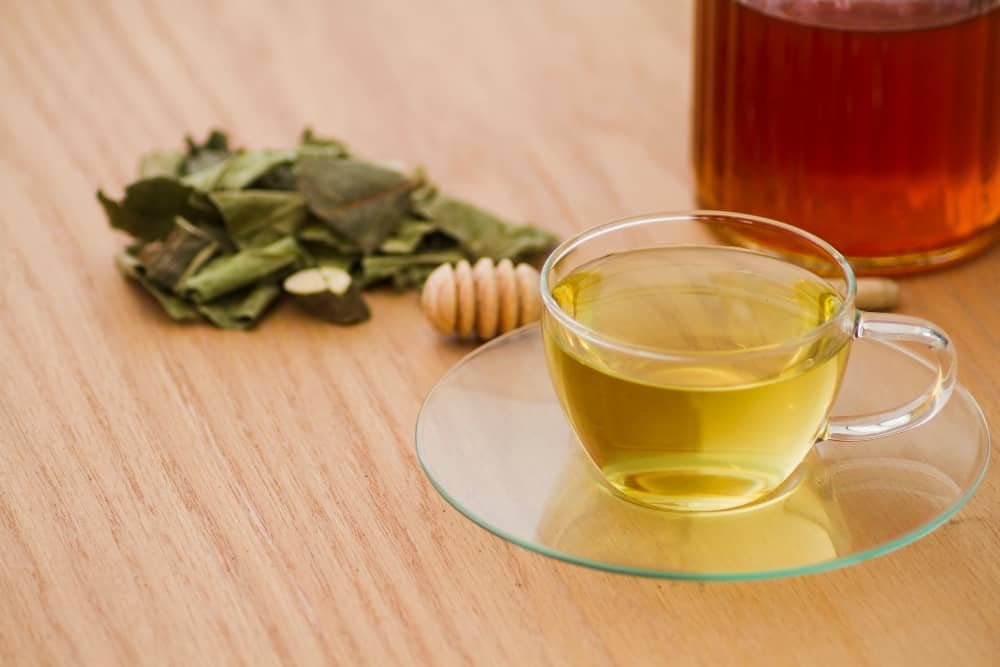
Recipe 7: Warm Honey Green Tea
Green tea has long been celebrated for its health benefits. Not only does it contain a wealth of antioxidants, but it can also help boost your metabolism and even reduce your risk of cancer. Adding honey to your green tea can enhance the flavor and add even more health benefits. This warm honey green tea recipe is one of the best ways to relax and find inner peace.
One of the main benefits of warm honey green tea is that the honey helps to reduce inflammation. Inflammation can contribute to several health conditions, so reducing it can be beneficial. The warmth of the tea also helps to soothe the body and relax the mind.
To make this recipe, you will need:
– 2 teaspoons of green tea
– 2 tablespoons of honey
– 1 cup of boiling water
First, place the green tea in a mug or teacup. Pour the boiling water over the tea and let it steep for about five minutes. Next, stir in the honey until it is completely dissolved. You can also add some lemon or lime juice for added flavor.
Now, slowly sip your warm honey green tea and enjoy the soothing, calming effects. The combination of green tea and honey has been shown to reduce stress and anxiety levels by promoting a sense of calm and relaxation. Drinking this tea regularly can help to bring clarity to your thoughts and provide an overall sense of inner peace.
Try this warm honey green tea if you are looking for an easy way to relax and find inner peace. There is nothing quite like the soothing effects of green tea and honey. Enjoy the benefits of this recipe and find the peace and balance you seek.
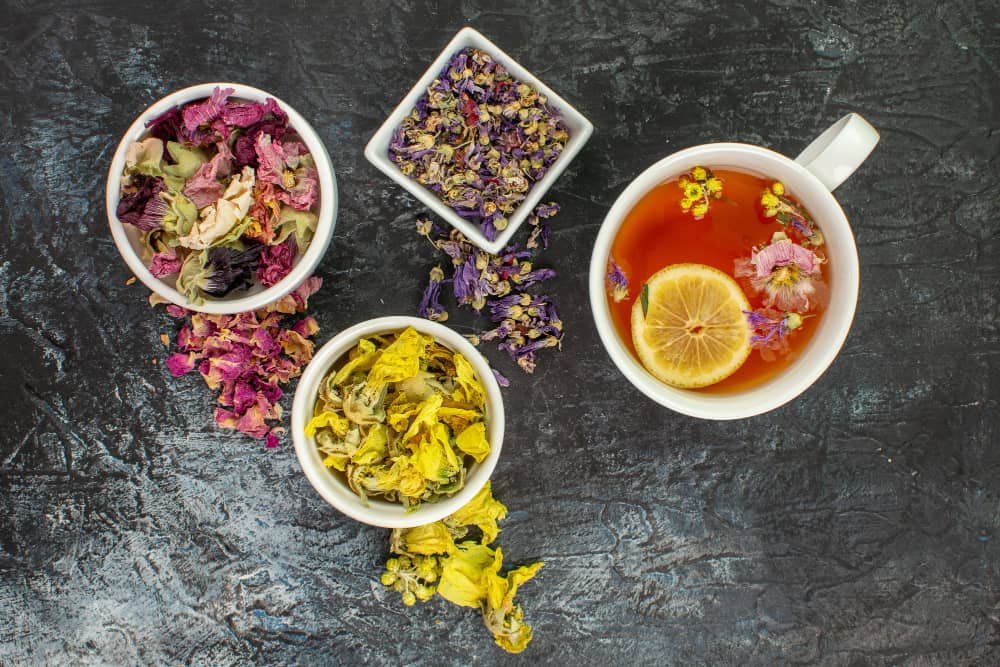
Recipe 8: Lavender-Chamomile Herbal Tea
If you’re looking for a relaxing and delicious herbal tea, try the delectable combination of lavender and chamomile. This herbaceous blend of herbal teas contains many beneficial properties that can help you unwind after a long day.
Chamomile is a mild-flavored herb that has a sweet, apple-like scent. It is known for its calming and sedative properties. It is also said to be beneficial for digestion and can help to reduce inflammation, as well as provide relief from anxiety and stress. Lavender is a fragrant herb that has a sweet, floral taste. It is said to promote relaxation, reduce stress and anxiety, and help to calm the nerves.
Combined, these two herbs create a superior blend that will relax and help you find inner peace. To make this herbal tea, simply steep one teaspoon of dried chamomile and one teaspoon of dried lavender in one cup of boiling water for five minutes. Strain the tea and add honey to taste.
The aroma of this tea is incredibly soothing and will help to create a peaceful atmosphere. Drinking this tea can help to reduce stress and tension in the body, as well as to soothe and relax the mind. It can also help promote a good night’s sleep, encouraging the body to rest and rejuvenate.
In addition to its relaxing benefits, this herbal tea can provide some health benefits. Chamomile is known for its anti-inflammatory properties, which can be extremely helpful in reducing inflammation and pain. Lavender also has anti-inflammatory properties and is said to benefit the immune system.
It is important to note that this herbal tea should not be consumed in large quantities. Too much of this tea can cause nausea and dizziness, and it is best to drink it in moderation. When consumed in moderation, however, this herbal tea can be a great way to relax and find inner peace. Enjoy!
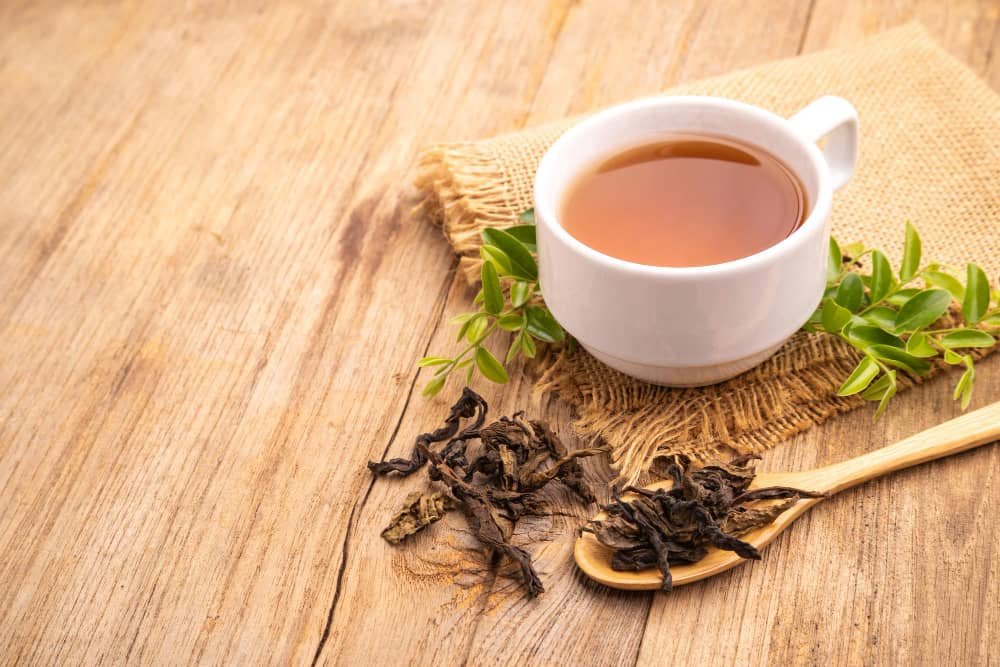
Recipe 9: Valerian Tea
Valerian root tea is a popular herbal remedy used for centuries to help treat insomnia, anxiety, and hypertension. The tea is made from the valerian root native to Europe and Asia. It’s known for its calming, sedating effects and is often used to promote restful sleep.
Valerian tea has a mild, woodsy flavor with a slightly bitter aftertaste. It’s usually steeped for about 10 minutes and can be enjoyed hot or iced. It’s important to note that valerian tea should not be consumed in large quantities or for long periods, as it can cause headaches and dry mouth.
Health Benefits of Valerian
Valerian is an herb that has many potential health benefits. It’s often used to treat insomnia, anxiety, and muscle aches. It’s also been studied for its potential use in treating epilepsy, menstrual cramps, and menopausal symptoms.
Valerian is packed with essential oils and compounds like valerenic acid and valerenol that give it sedative and calming effects. Studies have found that valerian root can activate specific brain receptors that can help reduce stress and anxiety. It’s also been found to have anti-inflammatory effects and can help reduce symptoms of mild depression.
How to Make Valerian Tea
Making valerian tea is easy. Start by bringing a cup of water to a boil. Once the water is boiling, please remove it from the heat and add one teaspoon of dried valerian root to the water. Let the root steep for 10 minutes, then strain the tea into a cup and enjoy. If the taste is too bitter, you can sweeten it with honey.
Valerian tea can be enjoyed hot or iced, and you can also add other herbs and spices to the tea to enhance its flavor. For example, add a few drops of lemon juice or a pinch of cinnamon to the tea.
Valerian tea is an excellent way to relax and unwind after a long day. The calming effects of this herbal tea can help you find the peace and relaxation you need to find inner peace.
Recipe 10: Ashwagandha Tea
Ashwagandha tea is a delicious and relaxing beverage for those seeking inner peace. Traditionally used in Ayurveda, ashwagandha is an ancient medicinal herb with many therapeutic qualities. Rich in antioxidants, this tea can help reduce stress and anxiety, boost brain function, and even fight off diseases. Here’s how to make it.
What is Ashwagandha Tea?
Ashwagandha is a medicinal herb found in the Indian subcontinent. The root of the plant is dried and powdered to make tea. The flavor of ashwagandha tea is slightly bitter and earthy but pleasantly sweet when mixed with honey or other sweeteners.
Benefits of Ashwagandha Tea
• Stress Relief: Ashwagandha has been known to help reduce stress and anxiety, making it an excellent choice for those seeking inner peace.
• Improved Brain Function: Studies have shown that ashwagandha can improve cognitive function and memory. It can even help with mild depression and improve sleep quality.
• Boost Immunity: Regularly consuming ashwagandha tea can help boost the immune system and fight infections.
• Healthy Heart: Ashwagandha can help lower cholesterol and blood pressure levels, benefiting your heart health.
How To Make Ashwagandha Tea
Making ashwagandha tea is an easy process. Here’s what you’ll need:
• 1 teaspoon of ashwagandha powder
• 1 cup of hot water
Instructions
1. Add the ashwagandha powder to the cup of hot water.
2. Stir the mixture until the powder is completely dissolved.
3. Let the tea steep for about 10 minutes.
4. Strain the mixture and enjoy your ashwagandha tea.
You can add other ingredients, such as honey or lemon, to make the tea more flavorful.
Ashwagandha tea is a great way to relax and find inner peace. With its many health benefits and pleasant flavor, this is one tea you should try.
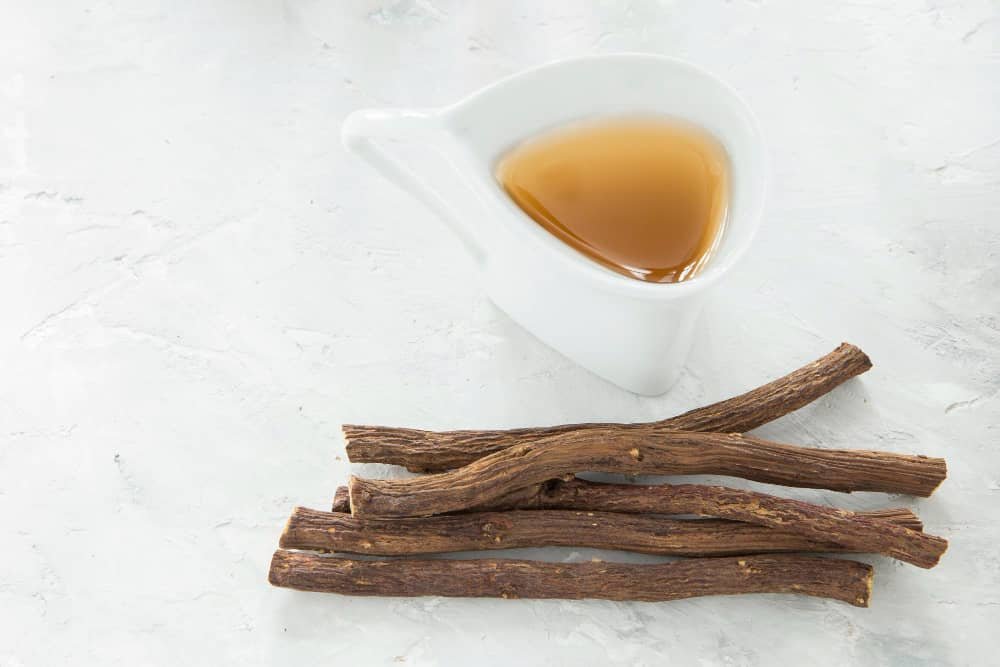
Recipe 11: Licorice Root Tea
Licorice root tea is a calming and relaxing herbal drink with several medicinal properties. It has a sweet taste and is often used to treat various health conditions, including nausea, arthritis, skin inflammation, and digestive problems. The root also has antispasmodic properties that can help reduce muscle spasms and cramps. Because of its many health benefits, licorice root tea has become increasingly popular as a natural remedy for stress and anxiety.
Licorice root is a plant native to Europe and parts of Asia and Africa. It has long been used in traditional Chinese medicine for its calming and soothing properties. Licorice root is rich in phytonutrients and antioxidants, including polyphenols and glycyrrhizin, which have anti-inflammatory and anti-allergy effects. It also contains several compounds, including the flavonoid glabridin, which has been shown to have antispasmodic, anti-inflammatory, and anti-stress effects.
The active compounds in licorice root are thought to help reduce stress and anxiety and can help improve the body’s response to stress by increasing the production of endorphins and serotonin. The root is also known to have mild sedative properties, which can help you relax and drift off into a peaceful sleep.
To make a licorice root tea, you will need a tablespoon of licorice root for every cup of water. Start by boiling the water in a pot. Add the licorice root once the water is boiling and simmer for 10 minutes. Turn off the heat, cover the pot, and let it steep for around 20 minutes. Once the tea is done steeping, strain it into a cup and enjoy.
Licorice root tea has many health benefits and can help treat various health conditions. The tea is known to have immune-boosting properties, and it has been shown to help reduce inflammation, soothe muscle and joint pain, and reduce allergy symptoms. It is also known to have antispasmodic and anti-stress effects, which can help reduce anxiety and help improve sleep.
In terms of flavor, licorice root tea has a sweet, earthy taste. Adding some honey or lemon can help enhance the flavor. Enjoying this tea regularly can help promote relaxation and reduce stress. If you’re feeling overwhelmed or anxious, a cup of licorice root tea can help bring a sense of calm.
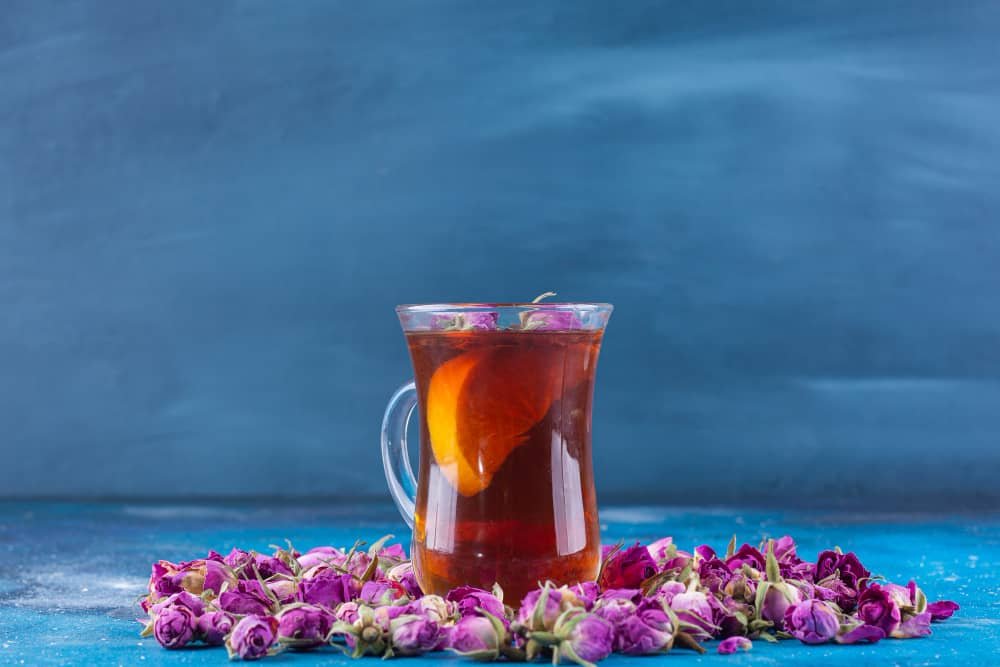
Recipe 12: Rose tea
Rose tea is a popular herbal tea that comes in various forms, all offering a unique flavor and a range of potential health benefits. Tea brewed from dried rose petals may have a sweet, floral aroma and a delicate flavor, while other rose teas, such as rooibos rose tea, may have slightly spicier or more earthy notes.
Regarding health benefits, rose tea is believed to have a mild sedative effect, making it a good choice to help relax and find inner peace. It’s also thought to have antioxidant and anti-inflammatory properties, which may help boost immune system health and reduce the risk of certain diseases.
To make your rose tea, gather fresh, chemical-free rose petals. If you can’t get your hands on fresh petals, you can also use dried rose petals. Place 2 tablespoons of petals into a heat-safe teapot or mug, then pour in boiling water. Let the tea steep for about 5 minutes, then strain the petals out before drinking.
Add a little honey or lemon to your rose tea for extra flavor. If you’d like a more robust cup of tea, you can steep the rose petals in boiling water for up to 10 minutes.
In addition to drinking rose tea as a hot beverage, you can make a cold beverage with rose petals by steeping them in cold water overnight. Once the petals have been steeped in cold water, strain the petals out and discard them. You’ll be left with a delicately flavored rose tea that can be served with ice and honey.
Rose tea is a great way to relax and unwind after a long day. Not only does it have a refreshing flavor, but it may also offer a range of health benefits. Try making your rose tea today and experience the inner peace it can bring.
Conclusion
After trying these 12 relaxing herbal tea recipes, you can find inner peace, restore balance, and improve your well-being. These herbal teas will help you relax, reduce stress, improve sleep, and soothe digestive issues. In addition to these physical benefits, the calming effects of these herbal teas can also bring mental clarity and emotional balance.
These teas can be enjoyed alone or blended for a unique flavor. Whatever your preference, these 12 recipes will provide the relaxation and inner peace you need to maintain a healthy lifestyle.
Post Disclaimer
The information contained in this post is for general information purposes only. The information is provided as is and while we endeavour to keep the information up to date and correct, we make no representations or warranties of any kind, express or implied, about the completeness, accuracy, reliability, suitability or availability with respect to the website or the information, products, services, or related graphics contained on the post for any purpose.
These statements have not been evaluated by the FDA and are not intended to diagnose, treat, cure or prevent any disease or health condition. If you have specific healthcare concerns or questions about the products displayed, please contact your licensed healthcare professional for advice or answers.


